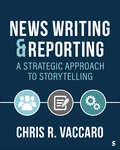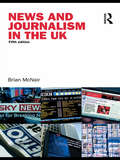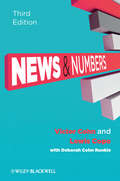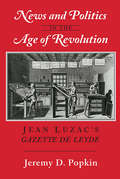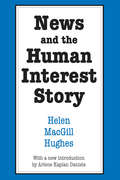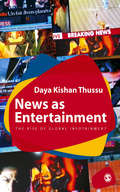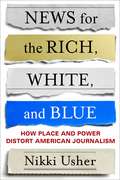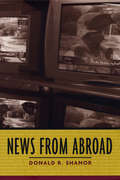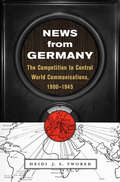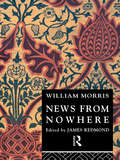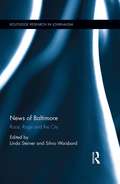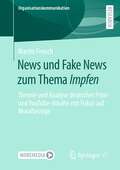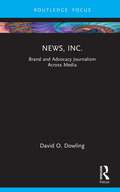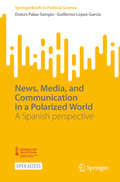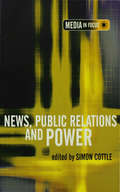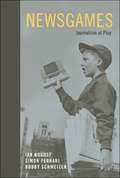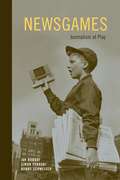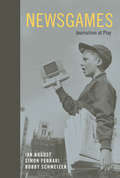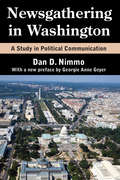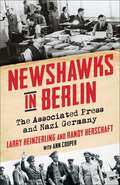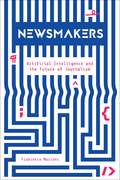- Table View
- List View
News Writing and Reporting: A Strategic Approach to Storytelling
by Chris R. VaccaroWith a focus on how the modern newsroom runs and operates, News Writing and Reporting: A Strategic Approach to Storytelling prepares students to become successful journalists in today′s competitive news industry. Author Chris Vaccaro applies an audience-centered and business-minded approach, discusses emerging media trends, and guides students through strategic thought in multiplatform reporting and storytelling. The book offers practical career tips, interviews with reporters, and full career and product development guides, while each chapter concludes with strategies and writing exercises to equip students with tactics for planning, structuring, and editing content across various platforms.
News Writing and Reporting: A Strategic Approach to Storytelling
by Chris R. VaccaroWith a focus on how the modern newsroom runs and operates, News Writing and Reporting: A Strategic Approach to Storytelling prepares students to become successful journalists in today′s competitive news industry. Author Chris Vaccaro applies an audience-centered and business-minded approach, discusses emerging media trends, and guides students through strategic thought in multiplatform reporting and storytelling. The book offers practical career tips, interviews with reporters, and full career and product development guides, while each chapter concludes with strategies and writing exercises to equip students with tactics for planning, structuring, and editing content across various platforms.
News and Journalism in the UK
by Brian McNairNews and Journalism in the UK is an accessible and comprehensive introduction to the political, economic and regulatory environments of press and broadcast journalism in Britain and Northern Ireland. Surveying the industry in a period of radical economic and technological change, Brian McNair examines the main trends in journalistic media in the last two decades and assesses the challenges and future of the industry in the new millennium. Integrating both academic and journalistic perspectives on journalism, topics addressed in this revised and updated edition include: the rise of online journalism and the impact of blogging on mainstream journalism the emergence of 24 hour news channels in the UK the role and impact of journalism, with reference to issues such as democracy, health scares and the war on terror trends in media ownership and editorial allegiances 'Tabloidisation', Americanisation and the supposed 'dumbing down' of journalistic standards the implications of devolution for regional journalists.
News and Numbers
by Lewis Cope Deborah Cohn Runkle Victor CohnNumbers and statistical claims dominate today's news. Politics, budgets, crime analysis, medical issues, and sports reporting all demand numbers. Now in its third edition, News & Numbers focuses on how to evaluate statistical claims in science, health, medicine, and politics. It does so by helping readers answer three key questions about all scientific studies, polls, and other statistical claims: "What can I believe?" "What does it mean?" and "How can I explain it to others?"Updated throughout, this long overdue third edition brings this classic text up-to-date with the 21st century with a complete updating of examples, case studies, and stories. The text emphasises clear thinking and common sense approaches for understanding, analyzing and explaining statistics, and terms throughout the book are explained in easy-to-understand, nontechnical language. Much new material has been added to ensure the text maintains its pertinent approach to the subject, including:A section on computer modellingAdditional chapters on risks and 'missing numbers'Updated sections on health plans and insurance, including updates on President Obama's health system overhaul & new material on health care costs and quality
News and Politics in the Age of Revolution: Jean Luzac's "Gazette de Leyde"
by Jeremy D. PopkinAt the center of this book stands the story of a great but forgotten newspaper: the Gazette de Leyde, edited by Jean Luzac from 1772 to 1798. A French-language biweekly newspaper published in the Dutch city of Leiden from 1677 to 1811, the Gazette de Leyde was regarded as the international newspaper of record, occupying the cultural niche filled today by the New York Times and Le Monde. Jeremy D. Popkin reconstructs the Gazette's history, providing a comprehensive picture of the environment that produced it, how it gathered and printed its reports, its relationship with its readers, and the way it depicted the great events of three critical decades. In rich detail he shows that absolutist regimes often cooperated with the Gazette's editors, providing information and condoning its publication in open violation of their own censorship regimes. He also examines the Dutch context which fostered both the freedom that made the paper's publication possible and the technology and business skills that allowed for its rapid publication and successful marketing. In addition, he draws on a wide reading of the press of the period to compare the Gazette with other major newspapers. He concludes with a treatment of the paper's fortunes during the era of the French Revolution.
News and the Human Interest Story
by Helen MacGill HughesIn this account of the growth of newspapers in modern, industrial society, Helen Hughes traces the development of a mass audience through analysis of the origins of the human interest story in the popular ballads of an earlier day. She shows how such commonly found interests as a taste for news of the town, ordinary gossip, and moving or gripping tales with a legendary or mythic quality have reflected the tastes of ordinary folk from the days of illiterate audiences to the present. She explains how these interests ultimately were combined with practical economic and political information to create the substance and demand for a popular press.In describing the rise and fall of newspaper empires, each with their special readership attractions, Hughes shows how technological innovation and idiosyncratic creativity were used by owners to capture and hold a reading audience. Once this audience developed, it could be fed a variety of messages—beamed at reinforcing and maintaining both general and specific publics—as well as a view of the world consonant with that of the publisher and major advertisers. Hughes offers a persuasive argument for the continuing viability of this method for combined social control, instruction, and amusement captured by the association of news and the human interest story.
News as Entertainment: The Rise of Global Infotainment
by Daya Kishan Thussu"Thussu brings to this project the passion for news of a socially committed former journalist, the political economy of his international relations education and a formidable assembly of global detail, examining the recent explosion of 'infotainment'." - John Downing, Southern Illinois University "Thussu's account of war as infotainment, the Bollywoodization of news and the emergence of a global infotainment sphere is as compelling as it is alarming. This is a significant and essential book for anyone interested in exploring the connections between news journalism, informed citizenship and democracy." - Bob Franklin, The Cardiff School of Journalism, Media and Cultural Studies Richly detailed and empirically grounded, this first book-length study of infotainment and its globalization by a leading scholar of global communication, offers a comprehensive and critical analysis of this emerging phenomenon. Going beyond - both geographically and theoretically - the 'dumbing down' discourse, largely confined to the Anglo-American media, the book argues that infotainment may have an important ideological role, a diversion in which 'soft news' masks the hard realities of neo-liberal imperialism. Chapters include a historical appraisal of infotainment; the infrastructure for its globalization as well as coverage of recent wars on television news as high-tech infotainment and the growing synergies between Hollywood and Bollywood-originated infotainment. A 'global infotainment sphere' is emerging, the book argues, within which competing versions of news - from 24/7 news networks to bloggers - coexist. Accessible, engagingly written and robustly argued, the book combines analyses of theoretical debates on infotainment with extensive and up-to-date comparative data.
News for the Rich, White, and Blue: How Place and Power Distort American Journalism
by Nikki UsherAs cash-strapped metropolitan newspapers struggle to maintain their traditional influence and quality reporting, large national and international outlets have pivoted to serving readers who can and will choose to pay for news, skewing coverage toward a wealthy, white, and liberal audience. Amid rampant inequality and distrust, media outlets have become more out of touch with the democracy they purport to serve. How did journalism end up in such a predicament, and what are the prospects for achieving a more equitable future?In News for the Rich, White, and Blue, Nikki Usher recasts the challenges facing journalism in terms of place, power, and inequality. Drawing on more than a decade of field research, she illuminates how journalists decide what becomes news and how news organizations strategize about the future. Usher shows how newsrooms remain places of power, largely white institutions growing more elite as journalists confront a shrinking job market. She details how Google, Facebook, and the digital-advertising ecosystem have wreaked havoc on the economic model for quality journalism, leaving local news to suffer. Usher also highlights how the handful of likely survivors—well-funded media outlets such as the New York Times—increasingly appeal to a global, “placeless” reader.News for the Rich, White, and Blue concludes with a series of provocative recommendations to reimagine journalism to ensure its resiliency and its ability to speak to a diverse set of issues and readers.
News from Abroad (Headline #No. 250)
by Donald ShanorOver the last two decades, following major conflicts in Kuwait, Kosovo, Afghanistan, and Iraq, Americans began to participate more actively than ever before in the world's numerous nationalist, religious, and ethnic conflicts. During this time, however, American news organizations drastically reduced the resources devoted to in-depth coverage of international affairs. Viewing foreign bureaus as an expensive luxury, major news providers closed overseas offices and cut the number of full-time correspondents working abroad, relying instead upon improvised news crews flown in on short notice to cover the latest crisis.In this insightful and hard-hitting investigation, former international news correspondent Donald R. Shanor follows the deterioration of international reporting and assesses the dangers that arise when U.S. citizens and policymakers are uninformed about foreign events until local problems erupt into international crises. Shanor also considers three major factors—technology, immigration, and globalization—that are influencing and complicating the debate over whether quality or profit should prevail in foreign reporting. In only a decade, the Internet has become a primary source of information for millions of Americans, particularly for younger generations. At the same time, a surge in America's immigrant population is rapidly changing the country's ethic and cultural landscape—making news from abroad local news in many cities—while global business practices are broadening the range of issues directly affecting the average citizen.News from Abroad provides a comprehensive portrait of the contemporary state of international news coverage and argues for the importance of maintaining networks of experienced journalists who can cover difficult subjects, keep Americans informed about the global economy, deliver early warnings of impending disasters and threats to national security, and prevent the United States from falling into cultural isolation.
News from Germany: The Competition to Control World Communications, 1900–1945
by Heidi J. TworekHeidi Tworek’s innovative history reveals how, across two devastating wars, Germany attempted to build a powerful communication empire—and how the Nazis manipulated the news to rise to dominance in Europe and further their global agenda. When the news became a form of international power, it changed the course of history.
News from Nowhere: Or An Epoch Of Rest, Being Some Chapters From A Utopian Romance / William Morris (Routledge English Texts)
by William Morris"This astute and long overdue reappraisal provides a lucid overview and a wealth of contextual information. An excellent resource." -- Shannon L. Rogers, Saint Joseph’s University, Editor, Newsletter of the William Morris Society in the United States"through his insightful introduction and careful selection of documents, [Arata] has created an invaluable edition of News from Nowhere." -- Peter Stansky, Stanford University
News of Baltimore: Race, Rage and the City (Routledge Research in Journalism)
by Silvio Waisbord Linda SteinerThis book examines how the media approached long-standing and long-simmering issues of race, class, violence, and social responsibility in Baltimore during the demonstrations, violence, and public debate in the spring of 2015. Contributors take Baltimore to be an important place, symbol, and marker, though the issues are certainly not unique to Baltimore: they have crucial implications for contemporary journalism in the U.S. These events prompt several questions: How well did journalism do, in Baltimore, nearby and nationally, in explaining the endemic issues besetting Baltimore? What might have been done differently? What is the responsibility of journalists to anticipate and cover these problems? How should they cover social problems in urban areas? What do the answers to such questions suggest about how journalists should in future cover such problems?
News und Fake News zum Thema Impfen: Theorie und Analyse deutscher Print- und YouTube-Inhalte mit Fokus auf Moralbezüge (Organisationskommunikation)
by Martin FenschDesinformation, Fake News zerstören Vertrauen und ver- oder behindern die rekonstruktive Konstruktion von Wirklichkeit mit weitreichenden Folgen für das individuelle Lernen und das gesellschaftliche Handeln. Die Arbeit beschreibt und definiert vor dem Hintergrund einer theoretisch-analytischen Auseinandersetzung mit dem Wahrheitsbegriff das Realphänomen der Fake News. Im empirischen Teil wird die deutschsprachige Impfkommunikation der Jahre 2018-2019 in ausgewählten Printmedien und auf YouTube im Rahmen einer Inhaltsanalyse unter anderem auf Fake News hin untersucht. Ebenfalls wird die Moral Foundations Theory genutzt, um moralische Inhaltsbezüge zu dekodieren und ihren Zusammenhang mit Fake News herzustellen. Kapitel zur Gesundheitskommunikation und zur Geschichte der Impfgegner bieten weiteren Kontext zur Deutung der Ergebnisse.
News, Inc.: Brand and Advocacy Journalism Across Media (Routledge Focus on Journalism Studies)
by David O. DowlingTaking a critical historical approach, this book examines the convergence of journalism and advertising industries that has led to the blurring of commercial and editorial functions within news organizations.This book considers the rise of brand journalism as it is broadly conceived across multiple genres and media forms, from brand-produced interactive documentaries such as Google’s “Beyond the Map” to sponsored multimedia features, videos, and podcasts made by news- and non-governmental organizations. Focusing on cases in North America and Europe, Dowling traces the origins of brand journalism and addresses key debates and disruptions brought about by the widespread adoption of the reportorial role by non-profits and corporations. These include journalistic concerns around threats to independence and impartiality and the commodification of reportorial integrity, as well as the reverse perspective in terms of the advertising industry’s adjustment to consumer ad avoidance. This project aims to situate these media products, industrially and culturally, in the context of competition for market share in the digital publishing industry. Ultimately, the study determines how the popularity of branded news content depends on the adaptability of corporate brands in spaces not typically associated with advertising and, in some cases, not yet discovered by competitors.News, Inc. is recommended reading for advanced students and researchers in fields including Digital Journalism, Public Relations, and Marketing Communications.
News, Media, and Communication in a Polarized World: A Spanish perspective (SpringerBriefs in Political Science)
by Guillermo López-García Dolors Palau-SampioThis Open Access book provides an in-depth analysis of the role held by media and journalists in a fragmented and polarized communication ecosystem that faces the uncertainty of major challenges, such as the impact of the disintermediation process, the pressure of simultaneous over- and disinformation forces, and labor precariousness. It discusses these challenges in the context of business model crises and the loss of journalistic quality. Following an interdisciplinary approach, the book further explores the interaction between communication and political and social change processes, their implications, and their consequences in a hybrid media context. The book examines the loss of credibility of traditional media and democratic institutions and discusses how trust can be restored. While doing so, it appeals to the innate link between journalism and democracy, based on the public&’s trust in the capacity of the media to provide quality content that allows citizens to make informed decisions. As the rise of disinformation presents an incredible challenge for conventional media, due to their position of extreme vulnerability, the book finally analyzes how media and professional journalists, who have traditionally held the responsibility of providing quality information, have to address these issues, while facing the disintegration of former business models and social credibility. This book will appeal to students, scholars, and researchers of political communication, journalism, political science, and related fields, as well as policy-makers and professionals interested in a better understanding of the role of media and journalists in contemporary political and social change processes.
News, Public Relations and Power (The Media in Focus series)
by Simon CottleIntroducing theoretical ideas and the latest empirical findings in this fast-developing field of media communication scholarship and study News, Public Relations and Power has contributions from leading international researchers who address issues such as: the rapid growth of public relations and its impact on news production; state information management strategies in times of internal political dissent; political parties and mediated `spin' conducted at national and local levels; the historically changing nature of war journalism; and tabloid television and forms of cultural representation. The book begins with Simon Cottle's introduction which sets out the key ideas and approaches in the field.
News: The Politics of Illusion, Tenth Edition
by W. Lance BennettFor over thirty years, News: The Politics of Illusion has not simply reflected the political communication field--it has played a major role in shaping it. Today, the familiar news organizations of the legacy press are operating in a fragmenting and expanding mediaverse that resembles a big bang of proliferating online competitors that are challenging the very definition of news itself. Audience-powered sites such as the Huffington Post and Vox blend conventional political reporting with opinion blogs, celebrity gossip, and other ephemera aimed at getting clicks and shares. At the same time, the rise of serious investigative organizations such as ProPublica presents yet a different challenge to legacy journalism. Lance Bennett's thoroughly revised tenth edition offers the most up-to-date guide to understanding how and why the media and news landscapes are being transformed. It explains the mix of old and new, and points to possible outcomes. Where areas of change are clearly established, key concepts from earlier editions have been revised. There are new case studies, updates on old favorites, and insightful analyses of how the new media system and novel kinds of information and engagement are affecting our politics. As always, News presents fresh evidence and arguments that invite new ways of thinking about the political information system and its place in democracy.
Newsgames
by Ian Bogost Simon Ferrari Bobby SchweizerJournalism has embraced digital media in its struggle to survive. But most online journalism just translates existing practices to the Web: stories are written and edited as they are for print; video and audio features are produced as they would be for television and radio. The authors of Newsgames propose a new way of doing good journalism: videogames. Videogames are native to computers rather than a digitized form of prior media. Games simulate how things work by constructing interactive models; journalism as game involves more than just revisiting old forms of news production. Wired magazine's game Cutthroat Capitalism, for example, explains the economics of Somali piracy by putting the player in command of a pirate ship, offering choices for hostage negotiation strategies. Videogames do not offer a panacea for the ills of contemporary news organizations. But if the industry embraces them as a viable method of doing journalism--not just an occasional treat for online readers--newsgames can make a valuable contribution.
Newsgames
by Ian Bogost Simon Ferrari Bobby SchweizerJournalism has embraced digital media in its struggle to survive. But most online journalism just translates existing practices to the Web: stories are written and edited as they are for print; video and audio features are produced as they would be for television and radio. The authors of Newsgames propose a new way of doing good journalism: videogames. Videogames are native to computers rather than a digitized form of prior media. Games simulate how things work by constructing interactive models; journalism as game involves more than just revisiting old forms of news production. Wired magazine's game Cutthroat Capitalism, for example, explains the economics of Somali piracy by putting the player in command of a pirate ship, offering choices for hostage negotiation strategies. Videogames do not offer a panacea for the ills of contemporary news organizations. But if the industry embraces them as a viable method of doing journalism--not just an occasional treat for online readers--newsgames can make a valuable contribution.
Newsgames: Journalism at Play
by Ian Bogost Simon Ferrari Bobby SchweizerHow videogames offer a new way to do journalism.Journalism has embraced digital media in its struggle to survive. But most online journalism just translates existing practices to the Web: stories are written and edited as they are for print; video and audio features are produced as they would be for television and radio. The authors of Newsgames propose a new way of doing good journalism: videogames.Videogames are native to computers rather than a digitized form of prior media. Games simulate how things work by constructing interactive models; journalism as game involves more than just revisiting old forms of news production. Wired magazine's game Cutthroat Capitalism, for example, explains the economics of Somali piracy by putting the player in command of a pirate ship, offering choices for hostage negotiation strategies.Videogames do not offer a panacea for the ills of contemporary news organizations. But if the industry embraces them as a viable method of doing journalism—not just an occasional treat for online readers—newsgames can make a valuable contribution.
Newsgathering in Washington: A Study in Political Communication
by Georgie Anne Geyer Dan NimmoIn the early twentieth century, Pulitzer Prize-winning journalist Walter Lippmann said that the presentation of truthful news lies at the heart of democracy. This volume strong strong stems from Dan D. Nimmo's conviction that opinion and policymaking are also significant, interrelated processes within any political system. A democracy poses problematic questions of the manner and means by which political ideas, opinions, and issues are transmitted throughout the body politic. In the United States, such communication is carried on primarily through the news media. Reporters and their sources interact to form crucial relationships linking citizen and official. Nimmo focuses on that interaction, using personal interviews with selected samples of Washington correspondents and their official news sources as his evidence. Nimmo's research examines the relationships that develop between news sources and reporters as each engages in political communication, indicates the factors most influential in determining such relationships, and suggests the implications such findings have for interpreting the tension that characterizes government-press relations in a democracy such as the United States. In this era of heightened attention to the role of the media in political discourse, reissuance of this volume could not be timelier. This study features a new preface by Daniel Pearl Award winner Georgie Anne Geyer. It should be read by all media specialists, communication scholars, and journalists, and will be valuable for those entering these fields as well.
Newshawks in Berlin: The Associated Press and Nazi Germany
by Larry Heinzerling Randy HerschaftAfter the Nazis came to power in Germany in 1933, the Associated Press (AP) brought news about life under the Third Reich to tens of millions of American readers. The AP was America’s most important source for foreign news, but to continue reporting under the Nazi regime the agency made both journalistic and moral compromises. Its reporters and photographers in Berlin endured onerous censorship, complied with anti-Semitic edicts, and faced accusations of spreading pro-Nazi propaganda. Yet despite restrictions, pressures, and concessions, AP’s Berlin “newshawks” provided more than a thousand U.S. newspapers with extensive coverage of the Nazi campaigns to conquer Europe and annihilate the continent’s Jews.Newshawks in Berlin reveals how the Associated Press covered Nazi Germany from its earliest days through the aftermath of World War II. Larry Heinzerling and Randy Herschaft accessed previously classified government documents; plumbed diary entries, letters, and memos; and reviewed thousands of published stories and photos to examine what the AP reported and what it left out. Their research uncovers fierce internal debates about how to report in a dictatorship, and it reveals decisions that sometimes prioritized business ambitions over journalistic ethics. The book also documents the AP’s coverage of the Holocaust and its unveiling. Featuring comprehensive research and a memorable cast of characters, this book illuminates how the dilemmas of reporting on Nazi Germany remain familiar for journalists reporting on authoritarian regimes today.
Newsletters and Press Releases: Bullet Guides
by Brian SalterOpen this book and you will - Get people's attention - Write compelling copy - Make an impact in the media - Keep your customers coming back
Newsletters and Press Releases: Bullet Guides
by Brian SalterOpen this book and you will- Get people's attention- Write compelling copy- Make an impact in the media- Keep your customers coming back
Newsmakers: Artificial Intelligence and the Future of Journalism
by Francesco MarconiWill the use of artificial intelligence (AI), algorithms, and smart machines be the end of journalism as we know it—or its savior? In Newsmakers, Francesco Marconi, who has led the development of the Associated Press and Wall Street Journal’s use of AI in journalism, offers a new perspective on the potential of these technologies. He explains how reporters, editors, and newsrooms of all sizes can take advantage of the possibilities they provide to develop new ways of telling stories and connecting with readers.Marconi analyzes the challenges and opportunities of AI through case studies ranging from financial publications using algorithms to write earnings reports to investigative reporters analyzing large data sets to outlets determining the distribution of news on social media. Newsmakers contends that AI can augment—not automate—the industry, allowing journalists to break more news more quickly while simultaneously freeing up their time for deeper analysis. Marshaling insights drawn from firsthand experience, Marconi maps a media landscape transformed by artificial intelligence for the better. In addition to considering the benefits of these new technologies, Marconi stresses the continuing need for editorial and institutional oversight. Newsmakers outlines the important questions that journalists and media organizations should consider when integrating AI and algorithms into their workflow. For journalism students as well as seasoned media professionals, Marconi’s insights provide much-needed clarity and a practical roadmap for how AI can best serve journalism.
